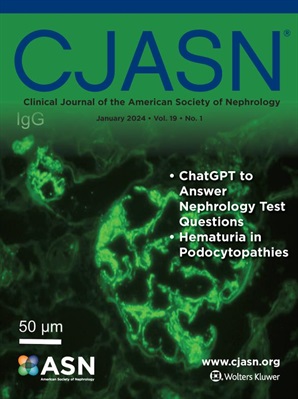Decision Readiness and Determinants of Kidney Replacement Therapy among Veterans with Advanced Chronic Kidney Disease.
IF 8.5
1区 医学
Q1 UROLOGY & NEPHROLOGY
Clinical Journal of the American Society of Nephrology
Pub Date : 2025-04-11
DOI:10.2215/cjn.0000000713
引用次数: 0
Abstract
INTRODUCTION Kidney disease stakeholders recommend a system-wide increase in home dialysis use. Kidney replacement therapy (KRT) decision readiness is associated with higher selection and use of home dialysis; however, KRT decision-making is complex, and factors informing KRT decision readiness in patients with advanced chronic kidney disease (CKD) are unclear. METHODS Using the baseline data of the Trial to Evaluate and Assess the effects of Comprehensive KRT-directed patient education on Home dialysis use among VETerans (TEACH-VET), we conducted a cross-sectional analysis to evaluate prevalent KRT decision readiness, defined as ability to choose any KRT modality among US Veterans with advanced CKD. We also evaluated Veterans' ability to achieve high-quality informed KRT decisions (more than 60% decisional confidence on a scale ranging from 1 to 100%) and selection of home dialysis as secondary outcomes. Univariate and multivariable logistic regression were used to test associations between patient-level variables and outcomes. RESULTS Of the 468 enrollees with a complete baseline dataset, 282 (60%) could not pick any KRT modality; the rest were split between high (20%) vs. low-quality (20%) decisions and home (21%) vs. in-center (19%) dialysis. Younger age, higher CKD stage, history of receiving prior KRT-directed education, rural habitation, and objective disease knowledge were positively associated with KRT decision readiness. Only objective disease knowledge was associated with KRT decision readiness after adjustments, with participants in the highest tertile of CKD-specific knowledge having two-fold (OR: 2.31, 95%CI: 1.18, 4.55) and KRT-specific knowledge having five-fold (OR: 5.16, 95%CI: 2.63, 10.32) higher odds of selecting their KRT. Item-level analysis showed that difficult, specifically KRT knowledge-related, items had a high discriminatory capacity to predict KRT decision readiness. CONCLUSION Veterans with advanced CKD are ill-prepared for KRT decision-making. While social determinants of health have a potential role in identifying high-risk populations, objective kidney failure and KRT-specific knowledge have a dominant impact on KRT decision readiness.患有晚期慢性肾病的退伍军人接受肾脏替代疗法的决策准备情况和决定因素。
肾病利益相关者建议在全系统范围内增加家庭透析的使用。肾脏替代疗法(KRT)的决策准备与家庭透析的更高选择和使用相关;然而,KRT决策是复杂的,影响晚期慢性肾脏疾病(CKD)患者KRT决策准备的因素尚不清楚。方法:使用“评估和评估退伍军人家庭透析使用综合KRT指导患者教育”(tee - vet)试验的基线数据,我们进行了一项横断面分析,以评估普遍的KRT决策准备,定义为美国晚期CKD退伍军人选择任何KRT模式的能力。我们还评估了退伍军人获得高质量的KRT决策的能力(在1到100%的范围内超过60%的决策置信度)和选择家庭透析作为次要结果。单变量和多变量逻辑回归用于检验患者水平变量与结果之间的关联。结果在468名有完整基线数据集的入组者中,282名(60%)不能选择任何KRT模式;其余的分为高质量(20%)和低质量(20%),家庭透析(21%)和中心透析(19%)。年龄较小、CKD分期较高、既往接受KRT指导教育的历史、农村居住和客观疾病知识与KRT决策准备程度呈正相关。调整后,只有客观疾病知识与KRT决策准备相关,ckd特异性知识最高五分位数的参与者选择KRT的几率高出两倍(OR: 2.31, 95%CI: 1.18, 4.55), KRT特异性知识的参与者选择KRT的几率高出五倍(OR: 5.16, 95%CI: 2.63, 10.32)。项目水平分析表明,困难的项目,特别是与KRT知识相关的项目,在预测KRT决策准备方面具有很高的歧视性能力。结论晚期CKD退伍军人对KRT决策准备不足。虽然健康的社会决定因素在确定高危人群中具有潜在作用,但客观肾衰竭和KRT特异性知识对KRT决策准备有主要影响。
本文章由计算机程序翻译,如有差异,请以英文原文为准。
求助全文
约1分钟内获得全文
求助全文
来源期刊
CiteScore
12.20
自引率
3.10%
发文量
514
审稿时长
3-6 weeks
期刊介绍:
The Clinical Journal of the American Society of Nephrology strives to establish itself as the foremost authority in communicating and influencing advances in clinical nephrology by (1) swiftly and effectively disseminating pivotal developments in clinical and translational research in nephrology, encompassing innovations in research methods and care delivery; (2) providing context for these advances in relation to future research directions and patient care; and (3) becoming a key voice on issues with potential implications for the clinical practice of nephrology, particularly within the United States. Original manuscript topics cover a range of areas, including Acid/Base and Electrolyte Disorders, Acute Kidney Injury and ICU Nephrology, Chronic Kidney Disease, Clinical Nephrology, Cystic Kidney Disease, Diabetes and the Kidney, Genetics, Geriatric and Palliative Nephrology, Glomerular and Tubulointerstitial Diseases, Hypertension, Maintenance Dialysis, Mineral Metabolism, Nephrolithiasis, and Transplantation.

 求助内容:
求助内容: 应助结果提醒方式:
应助结果提醒方式:


